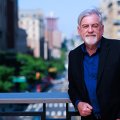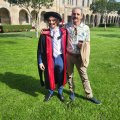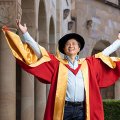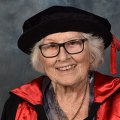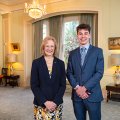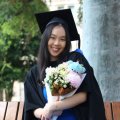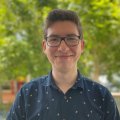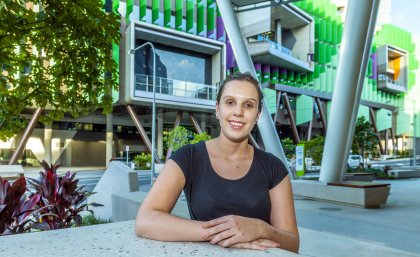
At first Alice Edwards thought her fatigue was caused by her first-year university studies, not a form of cancer she would have to battle on top of her degree.
The University of Queensland architecture student was diagnosed with Hodgkin lymphoma, a cancer of the lymphatic system, in 2013 - the first year of her Bachelor of Architectural Design.
Despite the medical challenges, Alice opted to continue two more years of study while undergoing chemotherapy treatment. She graduates with a Bachelor of Architectural Design tomorrow, December 16, one of 7500 graduating from UQ this December.
“The chemo affected my study as it made me very tired, which in turn made even the smallest tasks a challenge,” Alice said.
“A side effect of chemotherapy was that my concentration level decreased, making it even more challenging than usual to sit in a lecture or tutorial session.”
“I had to undergo six months of chemotherapy, with the majority of my treatment during uni holidays,” Alice said.
She said the journey was also very emotional.
“I was on a lot of medication and having to make constant trips to the hospital, getting scans and then the dreaded day when I had to sit in a chair for up to six hours and effectively make myself feel unwell again from the chemotherapy.”
“When you put that into perspective, it’s kind of hard to not want to get out of bed and forget about it all. Like everyone, I had my bad days where I did exactly that,” she said.
“But then I had my good days where I was able to do things that weren’t related to my cancer and they were what got me through.
“I kept going with university and work because it gave me something else to do or think about other than the hospital. I feel that was the best decision I could have made.”
She presented her final critique for semester 1, 2014, only two days after a round of chemotherapy. Later that year, her cancer went into remission.
“I am now healthy and excited to graduate at the end of the year,” she said.
Alice’s desire to continue her education so that she could graduate alongside her classmates was matched by the passion of her lecturer Michael Dickson.
“I had to undergo a stem cell transplant during second semester last year, so I finished the semester over the summer break with Mr Dickson’s help,” she said.
“The School of Architecture was very willing to help me out with my studies, and kindly worked around my needs during the rest of my chemotherapy in the first semester of my second year.”
Her classmates also helped by providing notes if she couldn’t attend lectures, and organising group assignments around her hospital treatments.
But meanwhile something else was afoot. All that time spent in hospitals was inspiring her to create change through architecture.
“I would like to help people through architecture, maybe even focus on health architecture as I’ve seen my fair share of hospital waiting rooms,” she said.
“I guess this is what inspired me to continue with my studies as one day I hope I can stand back from a building and say ‘I helped design that’ and watch people enjoy the building.”
What Alice also loves about architecture, is the ability to transform a design on paper to a built form.
“It is a journey of hard work and collaboration from many people that, in the end, makes a building that will last for years. That is kind of how I see myself. I would not be the person I am today if I had not been on this journey, or without the help and generosity I’ve received,” she said.
Alice is currently seeking work and looking to travel in Europe eventually to see “all the magnificent architecture we have learned about.”
Mr Dickson said Alice was a highly driven student with a deep passion for architecture that transcended her serious medical condition.
“Where others may have opted out of studies Alice persisted, which is important for sustaining momentum through studies and maintaining contact with her friends,” Mr Dickson said.
“We were more than willing to help her on her journey through a special program of studies over the summer break, and I’m confident she has a very promising career ahead of her.”
About 5500 of the estimated 7500 students graduating from UQ this month are expected to attend ceremonies at Gatton and St Lucia campuses.
UQ Vice-Chancellor and President Professor Peter Høj said each student graduating from UQ was gaining a qualification from a world-class university.
“UQ is consistently well inside the world’s top 100 in all major global university rankings, and two of these currently place UQ in the world’s top 50,” Professor Høj said.
Professor Høj said the December graduates would join UQ’s 232,000-strong alumni group – including more than 12,000 PhDs – in at least 170 countries.
Professor Høj said people who wanted to study at UQ in 2016 should apply through the Queensland Tertiary Admissions Centre.
Prospective students can see key dates for QTAC applications and offer rounds here. They can also contact UQ Admissions on (07) 3365 2203 or admissionsenquiries@uq.edu.au for information.
Instagram photos hashtagged #UQmemories or #UQalumni will be added to UQ’s December graduation collection.
Media: Madelene Flanagan, m.flanagan@uq.edu.au, +61 7 3365 8525
.jpg)
